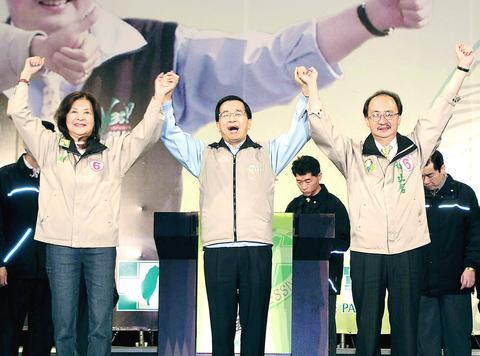President Chen Shui-bian (陳水扁) yesterday stood by his pledge to change the names of all relevant government agencies to "Taiwan" to avoid confusing the international community.
Chen made the remarks last night while stumping for Democratic Progressive Party (DPP) legislative candidates at a campaign rally in Miaoli County.

PHOTO: TSAI CHANG-SHENG, TAIPEI TIMES
He said that apart from government agencies based in countries that recognize Taiwan, where the national designation will remain "Republic of China," all agencies will change the country's name to "Taiwan" to emphasize the distinction between Taiwan and China.
During a speech endorsing candidates running in the county, Chen told the crowd he would be a lame-duck president if the pan-green camp was not able to control the legislature. He said Taiwan could no longer afford to engage in "social chaos" and allow "one or a couple of persons' hatred exhaust the nation" and prevent it from making any progress.
"On March 20, you gave me a chance with a second term in office. To allow me to do my work as president, I appeal to you for your support and to give me a clear pan-green majority in the new legislature so that I can deliver the promises I made during my re-election campaign," Chen said.
He urged voters to use their ballots on Saturday "to give Taiwan a chance for love, a chance for national unity."
Chen said a pan-green camp majority in the legislature would also strengthen his hand when dealing with China.
Among the other DPP heavyweights who took the stage last night to root for Miaoli candidates Tu Wen-ching (
In a bid for increased support in Miaoli, a region with a high concentration of Hakka residents and a traditional blue-camp stronghold, Yeh -- a Hakka herself -- and Su campaigned on the DPP administration's record of promoting Hakka culture, including the establishment of a dedicated TV channel and departments for Hakka studies in universities.
With Taiwan entering the final days of the campaign, starting today Chen will attend three or four campaign rallies nationwide every day in a last ditch effort to canvass support.
In related news, the director of the DPP's Taipei City headquarters, Huang Ching-lin (
Huang said his office applied for permission last week to hold the event, which is anticipated to attract at least 100,000 supporters.
Locations such as the Chiang Kai-shek Memorial Hall, Zhongshan Soccer Stadium and the old Sung-shan Tobacco Factory had all been turned down by the Taipei City Government, citing late applications or traffic concerns, Huang said.
Huang said the city government was acting out of political interests, a charge which city government spokesman Yu Tze-hsiang (游梓翔) denied yesterday.
The DPP will continue looking for a more suitable location, Huang said, though the chapter had already booked Shipai Junior High School for the rally, which can only fit 20,000 people.
Also see story:

Intelligence agents have recorded 510,000 instances of “controversial information” being spread online by the Chinese Communist Party (CCP) so far this year, the National Security Bureau (NSB) said in a report yesterday, as it warned of artificial intelligence (AI) being employed to generate destabilizing misinformation. The bureau submitted a written report to the Legislative Yuan in preparation for National Security Bureau Director-General Tsai Ming-yen’s (蔡明彥) appearance before the Foreign Affairs and National Defense Committee today. The CCP has been using cognitive warfare to divide Taiwanese society by commenting on controversial issues such as Taiwan Semiconductor Manufacturing Co’s (TSMC, 台積電) investments in the

INVESTIGATION: The case is the latest instance of a DPP figure being implicated in an espionage network accused of allegedly leaking information to Chinese intelligence Democratic Progressive Party (DPP) member Ho Jen-chieh (何仁傑) was detained and held incommunicado yesterday on suspicion of spying for China during his tenure as assistant to then-minister of foreign affairs Joseph Wu (吳釗燮). The Taipei District Prosecutors’ Office said Ho was implicated during its investigation into alleged spying activities by former Presidential Office consultant Wu Shang-yu (吳尚雨). Prosecutors said there is reason to believe Ho breached the National Security Act (國家安全法) by leaking classified Ministry of Foreign Affairs information to Chinese intelligence. Following interrogation, prosecutors petitioned the Taipei District Court to detain Ho, citing concerns over potential collusion or tampering of evidence. The

‘COMPREHENSIVE PLAN’: Lin Chia-lung said that the government was ready to talk about a variety of issues, including investment in and purchases from the US The National Stabilization Fund (NSF) yesterday announced that it would step in to staunch stock market losses for the ninth time in the nation’s history. An NSF board meeting, originally scheduled for Monday next week, was moved to yesterday after stocks plummeted in the wake of US President Donald Trump’s announcement of 32 percent tariffs on Taiwan on Wednesday last week. Board members voted to support the stock market with the NT$500 billion (US$15.15 billion) fund, with injections of funds to begin as soon as today. The NSF in 2000 injected NT$120 billion to stabilize stocks, the most ever. The lowest amount it

NEGOTIATIONS: Taiwan has good relations with Washington and the outlook for the negotiations looks promising, Minister of Economic Affairs J.W. Kuo said Taiwan’s GDP growth this year is expected to decrease by 0.43 to 1.61 percentage points due to the effects of US tariffs, National Development Council (NDC) Minister Paul Liu (劉鏡清) said at a meeting of the legislature’s Economics Committee in Taipei yesterday, citing a preliminary estimate by a private research institution. Taiwan’s economy would be significantly affected by the 32 percent “reciprocal” tariffs slapped by the US, which took effect yesterday, Liu said, adding that GDP growth could fall below 3 percent and potentially even dip below 2 percent to 1.53 percent this year. The council has commissioned another institution